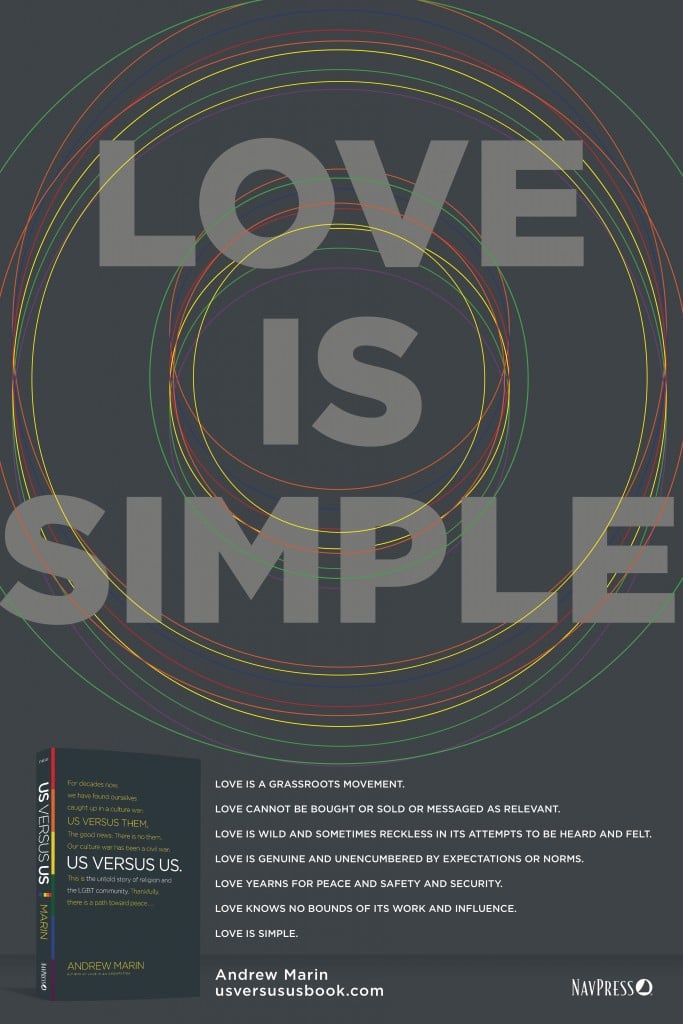The following post is by Jason Bilbrey, our Director of Pastoral Care here at The Marin Foundation. You can read more from Jason at his blog, www.jasonbilbrey.com
 “Discomfort over disengagement.”
“Discomfort over disengagement.”
I penned those words last summer as I was developing the Culture War Curriculum for the Continuing Education Classes we offer here at The Marin Foundation. It was one of seven values I proposed for peaceful and constructive engagement across opposing world views. And it sounded really good. “Our tendency is to disengage with the other when conflict arises,” I elaborated. “But building bridges requires us to step into this tension, anticipating and overcoming the inherent discomfort.” It reminded me of a thousand sermons I’ve heard about the difficult work of reconciliation, how it requires that we get out of our “comfort zone” and invest in taxing relationships.
Solid stuff, right? I was excited to teach it.
…Until the first day of class. I looked up from my notes at the faces of those in attendance. Many had traveled across the country because, for them, building bridges was not a passion, but the price of being gay within their family and church. And I was going to talk about embracing discomfort?
I sketched a big asterisk in my speaking notes beside the word. So here’s the blog post that will serve as the footnote annotation of this whole constructive engagement model we teach and practice here at The Marin Foundation:
Sometimes you have to walk away.
There’s a subtle but important difference between being uncomfortable and being unsafe. But when you recognize that line being crossed, you have to disengage from the relationship. It’s one of the hardest yet healthiest decisions you can make.
I would love to tell you where exactly to draw that line. I can’t. I can’t tell you when a relationship is safe and when it isn’t. Safety in this context is not something that can be objectively defined like that. It has much more to do with your feelings of emotional and psychological wellbeing than a checklist of external threats.
The temptation will be to compare yourself to those in similar circumstances. “If my gay friend can live at home with her ragingly homophobic parents,” you might think, “surely I can endure a few hurtful comments here and there from mine.” And maybe you can. Maybe it’s just uncomfortable. But maybe it’s more then that. Maybe hearing those few hurtful comments from your parents here and there hinders you from being able to function in a healthy way. Feelings of anger and insecurity arise for a reason. They’re important to feel. Give yourself permission to draw that line in a different place then your friend might. Some people have an incredible desire and capability to remain in relationship with those who treat them horribly. It’s ok if that’s not you. You don’t have to be a martyr.
Regardless of your capability or desire, it is never okay to be abused. Emotionally, physically, spiritually, sexually–it’s never okay. You may feel in some way that you deserve it. You don’t. No one does. Even if you feel guilt or shame, those emotions need to be explored within a peaceful, supportive environment, not within an abusive relationship.
When you finally cut ties with someone, treat it seriously. Explain to them what you’re doing and why. Tell them that you need a break from the relationship, or at least from any meaningful conversation. Make your boundaries clear. In the worse cases, cut off all contact, if only for a time.
And remember that it isn’t forever, necessarily. You’re not disengaging to be vindictive or passive-aggressive (hopefully!). You’re leaving the unsafe place that this relationship has created for you so that you may regain your emotional and relational equilibrium. And months or years from now, when you’re in a healthy place again, you can revisit the relationship and, God willing, work toward reconciliation with that person. And maybe the time apart has brought them to a healthier place too.
Much love.











